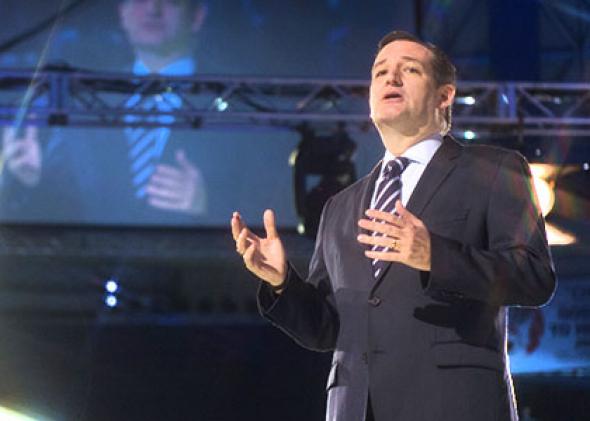With degrees from Princeton University and Harvard Law, Sen. Ted Cruz may have the most sterling academic résumé of any Republican presidential contender. But to officially announce his 2016 bid on Monday, he headed to a non-elite Christian school in central Virginia: Liberty University, the socially conservative school pastor Jerry Falwell founded in 1971. Much has been said about how Cruz’s choice of venue reflects his need to court the conservative evangelical Christian voters that propelled George W. Bush to two presidential victories, but Liberty’s importance isn’t just symbolism and optics. Since overcoming significant financial problems in the 1990s, the school has transformed itself into a conservative force in a state with a bitterly divided Republican Party. If the only people who heard Cruz’s speech today were the students sitting in the auditorium, it still would have been strategically valuable.
Falwell, whom Sen. John McCain once dubbed an “agent of intolerance,” died in 2007, but his legacy is alive and kicking at Liberty. That wasn’t always assured. In 1990, as Christianity Today reported, the school was $110 million in debt and on probation by accreditors. Things looked bleak. But major benefactors materialized, including the controversial Rev. Sun Myung Moon, and after Falwell’s death, the school used the millions he left in life insurance money to get debt-free. Since then, it’s seen its admission numbers swell, its endowment grow, and its clout in Old Dominion political circles expand.
“Falwell Jr. has made no secret of his branding strategy,” said Ken Cuccinelli, president of the Senate Conservatives Fund and former Virginia attorney general, referring to the late pastor’s son who now serves as the university’s president. “He wants to be the Protestant Notre Dame.”
It’s slowly getting there. The school reports that it has more than 13,500 students on campus and 95,000 or so taking classes online. And in the world of Virginia Republican politics, it has substantial sway.
“If you look at that university 20 years ago, they were struggling financially, they were still working hard to get their feet under them,” Cuccinelli said. “By the mid-2000s, they had some real momentum going. They’re now in an extremely strong position, and part of that trajectory has been just getting bigger.”
It’s become a powerful organizing center for conservative activists, according to Cuccinelli. More than perhaps any other single institution, Liberty produces thousands of graduates—many of whom remain in Virginia—who volunteer and vote for conservative causes. Though national evangelical Christians have shown less interest in conservative politicking during the Obama years, Liberty University has remained a stronghold for the religious Republican right. So Cruz’s speech Monday wasn’t just about courting the prominent and well-connected evangelical leaders who run and admire Liberty; it was also a chance for him to talk to a room full of potential future campaign workers.
“Every campaign is trying to find those 18-to-22-year-old, young, energetic, hardworking conservatives who will walk in neighborhoods in 100 degrees in August and knock on doors,” said one plugged-in Virginia Republican operative. “At Liberty University, you have thousands of those people.”
He added that speaking at Liberty will likely be a rite of passage for Republican presidential contenders courting social conservatives. Sen. Rand Paul and Cuccinelli spoke there in October 2013, and former Minnesota Rep. Michele Bachmann stopped by during her bid for the 2012 Republican presidential nomination. More interestingly, McCain spoke at the school in the run-up to his 2008 presidential bid, in an effort to make nice with social conservatives. Future presidential contenders are guaranteed to follow, though it may not be a universal draw.
“You’re probably not going to see a Chris Christie at Liberty,” said Cuccinelli. “You’re probably not going to see that. The odds are very low.”
More than anything else, the school is socially conservative, and numerous sources said its graduates and volunteers have helped push the Virginia Republican Party to the right. While the state’s moderate Republicans have sought to find candidates who focus more on regulatory policy and tax reform than on marriage and abortion, Falwell’s heirs have been part of a countervailing—and now dominant—force.
The Virginia Republican world is essentially divided into two factions: moderate, business-oriented Republicans who prefer that candidates be nominated in primaries, and grassroots, Tea Party-friendly, socially conservative activists who prefer using conventions to pick nominees. The acrimonious fighting between those two groups has often left the party’s eventual nominees hobbled and bruised, and it’s part of the reason Democrats control both Senate seats in Virginia as well as the governorship.
Liberty students and alumni aren’t a monolith, but they tend to follow in the socially conservative, grassroots-friendly category. And their organizing and activism have played a powerful role in pushing Virginia Republican politics rightward; after then-House Majority Leader Eric Cantor lost his primary in a shocking upset to Tea Party-friendly candidate Dave Brat, some moderate Virginia Republicans told me that their sway in the state had largely vanished. Liberty alumni and allies have fortified the conservative ranks that took down Cantor and his compatriots.
There are schools that are more conservative than Liberty, and there are schools that are bigger, but no school is both. The fact that Liberty is in a state that you have to win if you want to be president means that scheduling a campus visit may now be mandatory for Republican presidential hopefuls.
